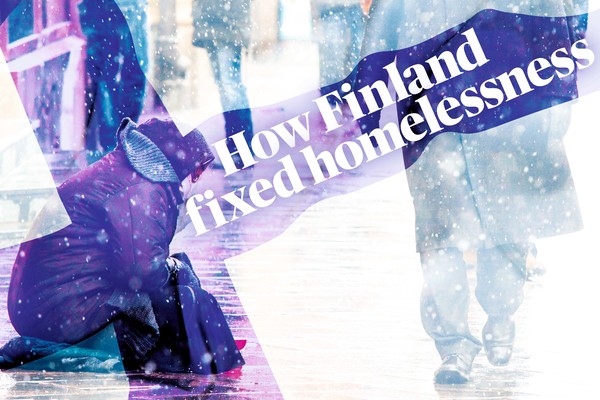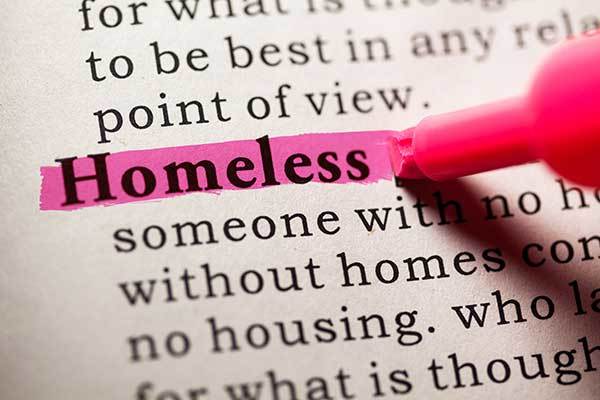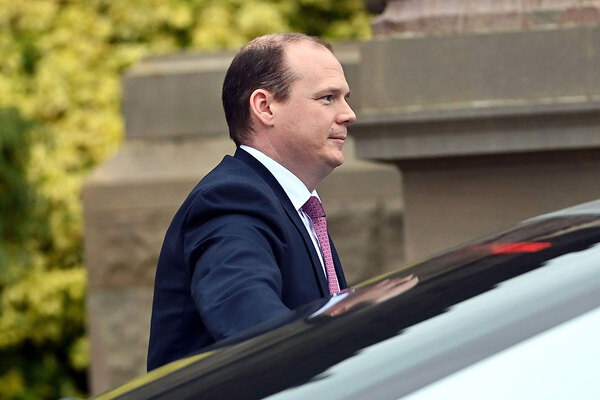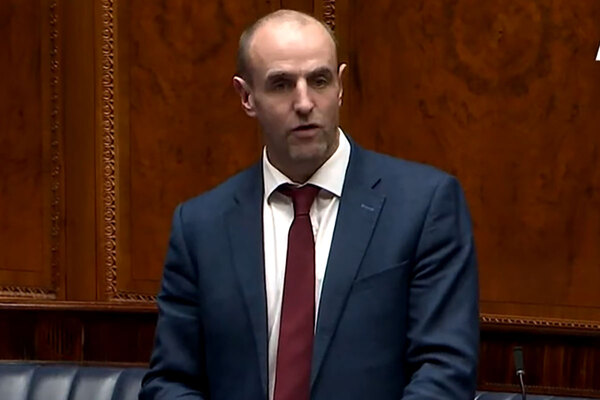You are viewing 1 of your 1 free articles
Breaking the silence: a council insider shines a light on the homelessness crisis
Councils have a number of homelessness duties – but their decisions can be difficult to scrutinise. Now, an anonymous council officer tells Kate Belgrave what is really happening. Illustration by Gary Neill
We hear a lot about how councils make homelessness decisions. But the sources of that information are very much looking from the outside in.
We have reports from the Local Government Ombudsman, such as the one at the end of last year drawing attention to families being stuck in unsuitable temporary accommodation.
We have Crisis’ exercise of sending ‘mystery shoppers’ to measure how councils treat individuals presenting as homeless.
"We don’t hear very often directly from homelessness officers who make the decisions on whether individuals are going to be housed or turned away"
Legal cases have cast some light too, as have activists and the stories of homeless people themselves.
But we don’t hear very often directly from homelessness officers who make the decisions on whether individuals are going to be housed or turned away.
With the budget pressure on councils, and the legal angle – remembering that how local authorities should respond to an approach from someone saying they are homeless is set out in law – perhaps it is not a surprise that council PR departments don’t always give access.
But what follows here changes that. It is based on a series of extended interviews with an anonymous homelessness officer, who we will call Alex.
They have worked at various councils in Greater London as a housing options officer (a frontline council officer who interviews homeless people and decides if they are eligible for council help with housing) and a reviews officer (who reviews decisions on homelessness applications if someone is turned down but they request a reassessment).
To open a window into how this sometimes works, Alex tells me about two recent decisions they knew about and which were later overturned. In both cases, the individual had been initially told that they were “intentionally homeless” – which would mean they were not eligible to be housed by the council. Alex describes the two decisions in uncompromising terms – as “bullsh*t”.
In one case, a woman was found to be ‘intentionally homelessness’ because she had left her home and the local area to escape a man who had raped her.
In the second case, another woman was found intentionally homeless after she was evicted for rent arrears: her abusive husband had left and stopped paying rent.
Both decisions, says Alex, were classic examples of findings which encompass three problems: a lack of officer expertise, callousness and the ingrained belief that benefit claimants and homelessness applicants lie about their circumstances as a matter of course.
“At some point there was optimism that people had a chance of finding nice places [to live], but that’s just not happening now.”
Homeless households are viewed as “scrounging”, Alex says.
However, arguably poor – or even illegal – decisions are not just a result of the attitudes of homelessness staff. Alex says that underfunding has caused a lack of expertise, as staff numbers have been cut and long-term officers have left and taken years of knowledge with them.
Alex’s own interest in housing and homelessness came about because they and their close friends were affected by the issue.
“A girl I was going out with was homeless. She was going through that system – first in a hostel and then in a flat,” says Alex. “I was in this house share. We were paying rent to this dodgy agent. [One day] the actual landlord arranged to meet with us. He said he hadn’t received any rent in the past six months. The agent had taken it all.” Everyone in the property was evicted.
Alex signed up for training to learn more about housing rights. “Then a [council] job came up [which I got]… It was better than I thought.”
Alex says the work became more fulfilling, “after they started bringing in housing options. [We did work] around prevention and early interventions – things like this to prevent homelessness – and specialist stuff like [people leaving prison who were potentially homeless]. It opened up opportunities – variations on the job, which made it more interesting. [The law came in around] families not being allowed to be in B&Bs for more than six weeks. People were living in a B&B for five years. It was terrible when you think back on it.”
Now, it seems like the clock is turning backwards. “[There’s] more people being stuck in B&Bs for a lot longer than six weeks. [There are] less options [for housing people]. Once the benefit caps and that came in, it killed a lot of that off. It was like what’s the f**king point, really… At some point [in the past], there was this almost optimism that people had a chance of finding nice places [to live], but that’s just not happening now.”
One major change has been the introduction of Local Housing Allowance (LHA) rates, which limit how much housing benefit can be paid.
Alex says that one real problem some councils have is that landlords now prefer to let places for temporary accommodation on a nightly basis only
The rates were calculated based on initially the lowest 50%, then the lowest third of private rents, but in much of London it has become nearly impossible to find a private rented flat that can be sustained on housing benefit alone.
Telling people that they can’t afford a tenancy does not become more palatable just because it is par for the course.
“We have to say to people: ‘This is the LHA rate and [that’s it].’ No council I’ve ever worked at is willing to help anybody with a rent deposit, or whatever, if the rent’s going to be higher than the LHA – if there’s any chance they’re going to get into rent arrears.
"It’s like: ‘No, you can’t, unless you find your own deposit. We’re not helping you with that.’ It’s this fear that it’s going to come back on the council.
The landlord’s going to say: ‘You told us to take them [a homeless tenant] on and they can’t afford it and they’re in arrears, so what is the council going to do about it?’ You know they are just going to blame the council.”
Officers are regularly scrambling to find homeless households temporary accommodation.
Alex says that one real problem some councils have is that landlords now prefer to let places for temporary accommodation on a nightly basis only.
Many have stopped offering their flats for longer-term lets and instead rent them to councils as more lucrative nightly lets.
What did councils say in response?
To get the council side of the story, we approached a selection of councils across London to ask about the various problems our anonymous homelessness officer Alex identifies in their testimony.
Most councils did not return requests for comment. Only Barnet Council responded on how it checks the quality of temporary accommodation – one of the major issues highlighted by Alex’s account. A spokesperson for the council says that it sends a qualified council surveyor to assess every property used for temporary accommodation.
“Quality checks are carried out regularly irrespective of the location of the property. Wherever possible, the quality checks are conducted before the client moves in. If this is not possible, as some accommodation is procured on the same day that a client presents as homeless, the checks are carried out as soon as possible after the tenancy starts,” the spokesperson says.
“You’re talking mostly about the cr*ppiest accommodation in London, or outside of London,” says Alex.
Situations border on the farcical. Alex mentions a 2016 case in which a homeless family was placed back in the flat that they’d been evicted from on the very same day – this time on a nightly let basis.
The family had lived in the flat for several years, but the landlord evicted them and told the council it could use the flat as nightly let temporary accommodation.
On the day they were evicted the family presented as homeless at the council. They were sent back to the flat they’d just left, this time to rent it night by night: “The family were evicted at about nine o’clock that morning. They came into [the] council. The officers said, ‘We’ll give you temporary accommodation.’ The accommodation that was given to them was the very house that they were evicted from that morning. They were like, ‘Where are we going?’
“[You] move somebody in and of course it is full of cold and damp, and things don’t work… You get some terrible places.”
“[The council said:] ‘You’re going back there, with the same landlord who evicted you.’ Imagine how p*ssed off they were. They’d been packing all their stuff up for three weeks and put it in storage.”
Standards in temporary accommodation are also a dispiriting part of the job, Alex says, describing some of the accommodation where homeless households are placed as “terrible places”.
Unfortunately, officers don’t have the resources to check all accommodation before placing people in it, especially when homeless households are housed in another borough. Councils often insist that temporary accommodation is always inspected – but “that’s bullsh*t” Alex says, a view that tenants I’ve interviewed generally share.
At a glance: Homelessness Reduction Act 2017
The Homelessness Reduction Act 2017 came into force in England on 3 April 2018.
The key measures:
- An extension of the period ‘threatened with homelessness’ from 28 to 56 days – this means a person is treated as being threatened with homelessness if it is likely they will become homeless within 56 days
- A duty to prevent homelessness for all eligible applicants threatened with homelessness, regardless of priority need
- A duty to relieve homelessness for all eligible homeless applicants, regardless of priority need
- A duty to refer – public services will need to notify a local authority if they come into contact with someone they think may be homeless or at risk of becoming homeless
- A duty for councils to provide advisory services on homelessness, preventing homelessness and people’s rights free of charge
- A duty to access all applicants' cases and agree a personalised plan
“They [officers] will ring up [a landlord or letting agent] and say: ‘Well, as long as they’ve got a gas safety certificate and an electrical safety certificate…’ Other than that, they ask the landlord: ‘Is the accommodation nice and clean and all that?’
“[The landlord will] be like: ‘Yeah, of course it is.’ [Then you] move somebody in there and of course it is full of cold and damp, and things don’t work, and there are rats running around. Mould is the biggest problem. It affects some people’s health and clothes, and everything else… You get some terrible places.”
In April councils took on additional duties under the Homelessness Reduction Act 2017, which says that everyone who is homeless or at risk of homelessness should get meaningful help.
With resources stretched so far, the obvious question is how will this be done?
Alex says the spirit of the Homelessness Reduction Act is good, but doubts that New Burdens and the Flexible Homelessness Support Grant allocated to help councils cope with these extra duties will come close to touching the homelessness crisis.
That money can’t pay for the staff, rent deposits, ongoing rent support and affordable housing that the crisis really needs.
“New Burdens is not a lot of money really, especially over three years,” Alex says. “We’re hearing all this stuff about Southwark with the pilot [Southwark is one of the authorities that is piloting the act].
“The [number of] reviews [of homelessness decisions] has gone down. It turned out that the government very kindly gave them a million pounds to spend on it, which obviously helped. They’ve got this big army of people there doing all this prevention work. They are doing loads of good stuff in a way, but they have got loads of money to do it.”
Cathy at 50 campaign
Our Cathy at 50 campaign calls on councils to explore Housing First as a default option for long-term rough sleepers and commission Housing First schemes, housing associations to identify additional stock for Housing First schemes and government to support five Housing First projects, collect evidence and distribute best practice.














